On Thursday July 24th, I left home for my second visit to the People’s Republic of China! (see report and video of my first visit here, and pics here) This time I was invited by a Beijing-based aromatherapy school, Floralwish. The most obvious difference from my 2011 trip was the weather – instead of November’s freeze, I encountered a very warm and humid August, with average temps of around 90F. And this time, after my weekend seminar in Beijing, I was going to repeat it a week later in Shanghai, providing time for some sightseeing in between.
After my 13 hour Air China flight I arrived in Beijing at 5.40 am. Ellen, the Floralwish owner, and Orange and Joanna, my guides for most of my stay, took great care of me, and welcomed me with an immaculate placard! After a 90-minute drive across the city we arrived at the Lakeview Hotel, which would be my home for the next few days as well as the venue for the first seminar. The hotel is a part of Beijing University Campus and is busy with guests and conferences. It has an amazing courtyard garden with waterfalls, duck ponds, lotuses in flower, and tress that included apricot, weeping willow and gingko biloba.
In the afternoon I met with Liza, who would be my translator for both the events. (People in China often try to make it easier for us to remember their names by choosing a westernized one.) Liza has a degree in TCM and specializes in cancer treatment. When we met she had already taken extensive notes, especially for the names of constituents. We were able to run through the presentation quite quickly to make sure everything was clear.
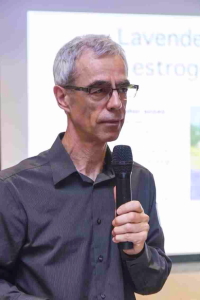 Friday was a day of rest and final preparation for the event, and on Saturday morning I made my way to the seminar room. The 65 attendees arrived at 10.00 am, keen to acquire new information about how to use essential oils with minimal risk. On the first day I covered general topics such as the difference between hazard and risk. I used an analogy about crossing streets in Beijing – there is hazard, but various factors increase or decrease actual risk (such as speed of traffic, amount of traffic, and how good your vision is).
Friday was a day of rest and final preparation for the event, and on Saturday morning I made my way to the seminar room. The 65 attendees arrived at 10.00 am, keen to acquire new information about how to use essential oils with minimal risk. On the first day I covered general topics such as the difference between hazard and risk. I used an analogy about crossing streets in Beijing – there is hazard, but various factors increase or decrease actual risk (such as speed of traffic, amount of traffic, and how good your vision is).
I also talked about different types of evidence (in vitro, in vivo, clinical etc), and the different methods of administration and their specific constraints. There was a lively discussion about long-term inhalation. I recommend that a 30-60 minute period of inhalation should be followed by inhalation of “clean air” for the same amount of time to avoid adverse effects. I call this intermittent inhalation, or diffusion. For very low levels of fragrance, barely perceptible, it’s not important.
We also discussed the pros and cons of patch testing in some detail. In general, I don’t feel it is necessary unless there is a known problem. At the end of the day there was a group discussion and revision of all that had been covered.
On Saturday night there was a special gastronomical treat. The organization team and translator, four amazing women, took me to a popular “hot pot” restaurant. Set into the middle of the table were two rectangular containers filled with seasoned water, one spicy and one not, placed over gas burners. As the evening progressed, various foods were dropped into the boiling water – from chicken, lamb and beef, through tofu of all kinds and forms to duck tongue and a cuttlefish meatball, which was quite delicious. We were also treated to what might be described as a “noodle dance”, similar to the tossing of pizza dough. One of the staff appeared by our table and proceeded to stretch out flat noodles made of tofu till they were perhaps 6 feet long, at the same time dancing them through the air in fast-moving ribbons. He then deftly shortened them with his (gloved) fingers, and tossed into the boiling pot. I was impressed, and the noodles were very tasty.
Back at the seminar on Sunday, we successfully negotiated the safety aspects of some weight subjects including cancer, pregnancy, drug interactions and phototoxicity. We paused occasionally to make sure that plant names were being correctly translated (botanical names are not much used in China), and there were questions about the use of wintergreen oil together with blood-thinning drugs. The issue of whether and which essential oils can be used to help treat cancer was raised. In response to this I talked about research on perillyl alcohol (mainly for brain cancer) and Zedoary (Curcuma zedoaria) essential oil (liver cancer). Perillyl alcohol is a constituent of Perilla frutescens oil, which is produced in both China and Japan, but is not well known outside Asia. See more on this emerging research. As always in Asia, there was an extensive photo session after the event.
There was a pre-arranged magazine interview on Monday afternoon with Modern Brides. The editor wanted to know the various ways that essential oils could be used to help married couples. She asked many questions in the area of relaxation, mood changers, aphrodisiacs, and which oils would revive a “tired” relationship. At one point I talked about creating an “anchoring” blend by using it during a vacation to build an association with feeling good, and then afterwards bringing out the blend only when really needed. I also suggested that a blend of bergamot, sandalwood, frankincense and jasmine would be useful for “feelgood” and sensuality. After the interview we drove into the center of Beijing for lunch, and to visit the Floralwish premises, which are located in a Hutong area.
On Tuesday, Orange and Joanna took me to the Great Wall, specifically to a part called Badaling. As we approached the area, hills seemed to suddenly spring up, and then we could see the wall hugging both peaks and valleys. It is of course a stunning feat of engineering, with millions of heavy stones perfectly laid across hilly terrain. This section was built in 1504, and is maybe a mile in length. Very few sections are flat, and some are very steep, and stepped. After a couple of hours of wall-walking (to the end of this part and back again) we had a much-needed lunch, and then drove back into Beijing.
On Wednesday I visited Darren Moore and his family. Darren had been my host in 2011 and it was great to see him again. He is Canadian, and settled in Beijing when he fell in love with a local girl. As well as making natural soaps and cosmetics (he does not even like to use emulsifiying agents for lotions) his mission is to inspire others to return to a more local, organic and small-scale style of living. New to me was a walled vegetable garden, where he has green beans, fruit trees and a lot of sweet corn. We visited a local park where we saw hundreds of coi carp in a pond being fed. For dinner we drove to an artists district where we ate lamb skewers and some delicious thin, black noodles made from fern. Thursday was another rest day, and Friday was a travel day.
Due to some political issues, many domestic flights in China were delayed or cancelled so it was decided that we would take the train to Shanghai instead of flying, as had been planned. At Beijing train station I said goodbye to Ellen, who would not be coming to Shanghai. The journey was fast and smooth: traveling at 200 mph, it took only 5 hours to travel almost 1,000 miles and we crossed the two longest bridges in the world, the Danyan-Kushan Grand Bridge and the Tianjin Grand Bridge. As we traveled through the city of Nanjing I discovered that the name means “capital of the south”, while Beijing means “capital of the north”. After a long drive from the train station we arrived at the hotel, which again was also the venue for the seminar. My room at the Wyndham Bund East Shanghai hotel had stunning views of the Huangpu river and the Yangpu bridge that crosses it.
Shanghai is different to Beijing in many respects. The architecture is more European, the air is less polluted, and the food is sweeter and less spicy than in Beijing. Unfortunately, I found the espresso coffee in the hotel undrinkable, but the choice of rice, tofu, veggies etc at breakfast was very welcome, as it had been in Beijing.
There were 30 attendees at the Shanghai seminar, including, unusually, 5 guys. A few participants spoke excellent English and one lady had travelled from the Philippines for the event. Liza was already familiar with my material of course. Among the questions asked was the issue of fennel oil and its probable estrogenic action. We know that fennel tea, apart from relieving colic, promotes production of breast milk, and I have recommended that the oil should not be used in either pregnancy or breastfeeding. I am now wondering if I should reconsider my breastfeeding ban for fennel oil.
Sunday was my last evening in China and I was given a spectacular send-off. Dinner was in a Thai restaurant in the exciting Bund area of Shanghai, which at night is spectacularly lit. The restaurant was on the riverbank with magnificent views of the brightly lit skyline of Shanghai, and the food was amazing. But it seemed as if China wanted to make my trip especially memorable, and just as we finished our meal, a major firework display began on the other side of the river. We walked out to the riverside to watch it. Even the restaurant staff seemed surprised. On Monday, after packing, signing attendance certificates for both events, and having a quick lunch in the hotel, I left China and flew back to Los Angeles. It was an inspiring and memorable trip.
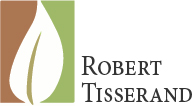
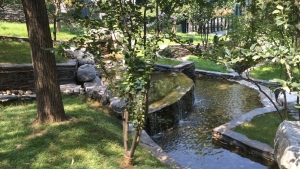
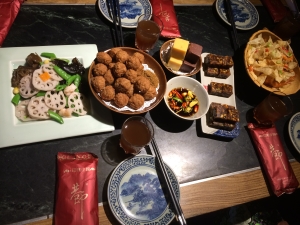
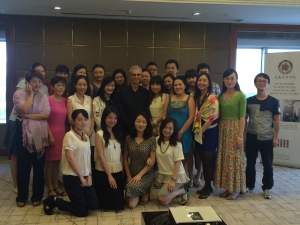
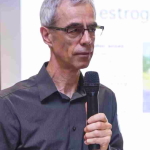
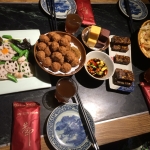
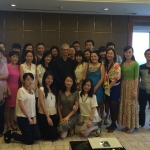
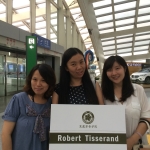
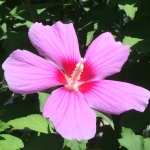
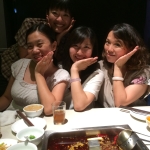
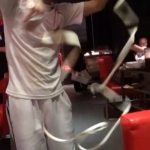
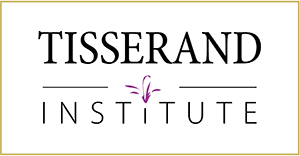
Thank you so much for sharing your trip details. I felt like I was there. 🙂
Great information that is inspiring for the expansion of true aromatherapy..We are so fortunate to have you as an innovator and teacher in the field. I appreciate you spreading and sharing the knowledge. I am headed to Vietnam soon. Any tips on oils there for researching..I would love to hear about.
thanks so much for sharing !
Thank you for sharing this wonderful account of your travel and teachings. I loved it, along with the specific info shared. I will now drink fennel tea more often! Interesting how several herbs that calm the digestive system also affect hormones and adrenals. You mentioned fennel but this is also true of ginger and licorice.
Fantastic report Robert! Thank you for not only imparting essential oil safety and valuable EO info, (in particular Perilla frutescens) but also a little taste of Chinese culture as well. It was delightful to read!
thank you, robert, for sharing your trip to china in such detail. your description of the food reminds me of my trip to tokyo in march, such fun to discover very different tastes!
Hi Robert,
Just recently came across this interesting article, thought I’d share it with you 🙂
http://www.skininc.com/skinscience/ingredients/Sandalwood-Scent-Found-to-Facilitate-Skin-Regeneration-267344261.html